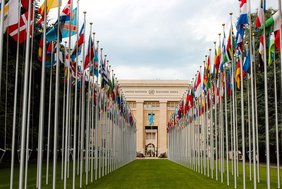The 13th Conference of the Intergovernmental Group of Experts on Competition Law and Policy has taken place from 20-22 July 2022 at the Palais des Nations in Geneva. UNCTAD-United Nations Conference on Trade and Development is part of the United Nations Development Group. As a permanent intergovernmental body of the UN, it reports to the General Assembly and the Economic and Social Council. UNCTAD is headquartered in Geneva/Switzerland, with offices in New York and Addis Ababa.
The United Nations Conference on Trade and Development sees its goal in prosperity for all citizens. The UNCTAD Research Partnership Platform offers selected experts a scientific and political exchange for the realisation of the sustainable development goals of the United Nations.
With convened participants from government, business and academia, UNCTAD's 13th session focused global attention on competition law enforcement and consumer policy in developing countries in the digital age.
With her international competition expertise and background as a German NGA (Non-Governmental Adviser) to the Bundeskartellamt, Professor Hildebrand was one of the exclusive top speakers of the UNCTAD Expert Group on Competition Law and Policy.
In her presentation, Professor Hildebrand commented on the global impact of the New Brandeis movement / Ordo-liberalism in competition policy. The focus of her speech was on the influence of market dominance of a few companies in the digital world and its operational effect on social implications in emerging and developing countries. In particular, Professor Hildebrand has shed light on the political anti-trust movement in digital markets that originates in Europe and weighs the new dimension against general anti-trust objectives. The European School on competition economics developed by Professor Hildebrand provides the appropriate competition-economy rationale which is in fact applicable worldwide.
The final plenary session focused on the assessments and deliberations of all participating experts on the realisation of the United Nations' Agenda 2030. With its 17 Sustainable Development Goals, the UN is pursuing a common plan for the benefit of peace, prosperity and protection of the planet.
Further information:

